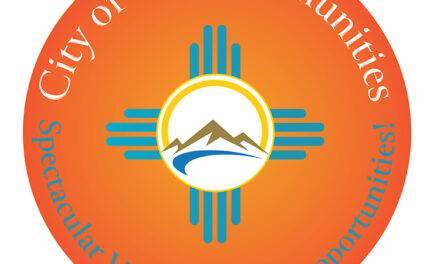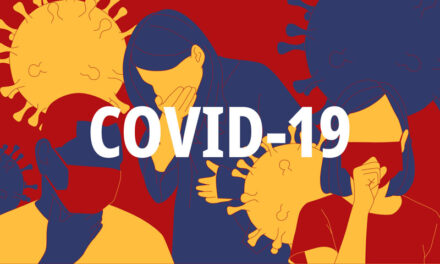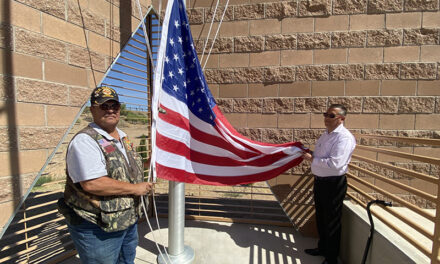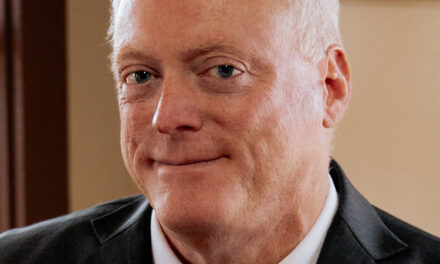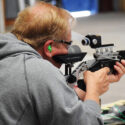PERALTA – Finding “back doors” into jobs and the importance of hands-on skills were the central talking points on how to help teenagers and young adults on the autism spectrum successfully enter the workforce during a presentation by Dr. Temple Grandin this weekend.
A professor of animal science at Colorado State University, Grandin rose to prominence in the animal world for her designs of livestock handling facilities and has become an advocate for neurodivergent people around the world.
Neurodivergent is a non-medical umbrella term that describes people with variation in their mental functions, according to Forbes Health, and can include conditions such as autism spectrum disorder.
“And I had no speech till age 4,” said Grandin, who is on the autism spectrum. “I cannot emphasize the importance of early intervention. That is super important. I was in therapy by 2 1/2 years old.”
Grandin spoke to a crowd of more than 100 people gathered Saturday afternoon at Wilderwood Equine Therapy, a Peralta nonprofit that provides services to children and adults with autism.
Grandin visited the equine center to promote her most recent book, “Visual Thinking: The Hidden Gifts of People Who Think in Pictures, Patterns, and Abstractions.”
Many in the crowd nodded in agreement and recognition as Grandin explained how people with autism process the world.
She noted many, including herself, have a “slow processor. It’s like the phone on one bar of service trying to load a web page. You have to give them time to think, to respond.”
Many children with autism develop very specific interests, she said, and parents and teachers need to encourage them to broaden those interests.
“I would draw the same horse head over and over and over again. I had a little sign painting business, and I had to learn to make a sign that a customer wanted,” Grandin said. “My first paid sign was for a hair salon, and I don’t think she would have liked horses all over it.”
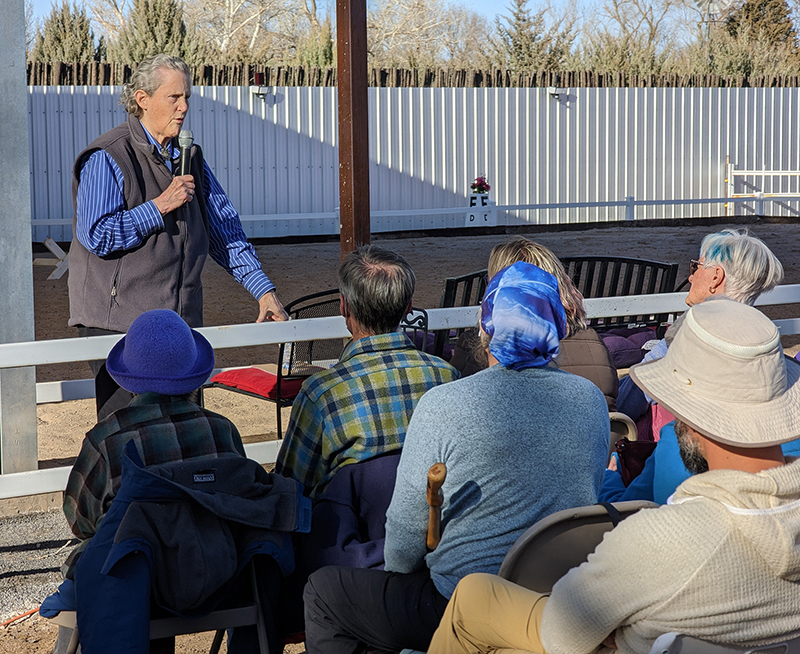
Julia M. Dendinger | News-Bulletin photos
Dr. Temple Grandin addresses a crowd of about 150 people during a fundraiser at the Wilderwood Equine Therapy center in Peralta last Saturday afternoon. Grandin spoke about the need to find better pathways into the workforce for people with autism.
A deep interest in and talent for art, music, mechanical systems and animals are often found in people with autism, she said.
“Those things go together. You can get an extreme visual thinker like me,” Grandin said. “We’re doing a good job with the younger kids. It’s with the older kids, things are really not working. Getting them into the world of work.”
Grandin emphasized academic skills and job skills are two different things.
“If I was 17 years old today, in California I would not be able to graduate from high school,” she said. “Because visual thinkers, like me, do not do algebra.
“I’ve seen people who started out working on the line at a meat packing plant and, 15 years later, they are in charge of the new plant edition. I’ve seen a person take one class in computer aided drafting and he gets a job designing entire factories.”
Getting to that point may require some “back door” ways of entering the workforce, she said. Start in your neighborhood, Grandin advised.
“When I was 13, Mother got me a sewing job with a seamstress who worked out of her house … At 15. I was cleaning horse stalls,” she said. “Find volunteer jobs for 11 and 12 year olds, maybe it’s at a stable, at a church or farmers market.
“I’m seeing too many parents that can’t let go. I’ve seen this over and over and over again. They don’t think (their children with autism) can do anything. And the amount of teenagers I’ve seen that have never gone shopping by themselves … I wish I didn’t have to talk about shopping.”
Starting small and slow is key to introducing youth with autism to the workforce, and making minor accommodations will help with their success.
“Don’t start with the chaos at a super busy McDonald’s. That’s what you don’t do,” she said. “I asked one mother, ‘Who do you know who owns a business?’ She said, ‘Oh, I have a friend that has this little office supply, gift shop,’ and I go, ‘Perfect. Get your kid a job in there.’”
Minor accommodations in the workplace are also important for people with autism, Grandin said.
“I have no working memory. I do not remember long strings of verbal information. Just the other day, I heard a sad story.
“A mom told me that her kid was an electrician’s apprentice and he got fired. The reason why is the electrician goes, ‘Yakety, yak, yak, dimmer switch, ceiling light.’ What they needed to do is give him a (written) list of the things to install. Simple accommodations. In engineering, that’s called a workaround. I happen to like engineering language.”
In her newest book, Grandin writes about skill loss, saying it’s a very serious issue.
“I want to see kids that are different getting good careers. Computer programming — (artificial intelligence) is going to replace basic computer programming,” she said. “So, if you want to study that, you better take some electrical engineering along with it and some physics cause AI will not be able to replace that right away.”
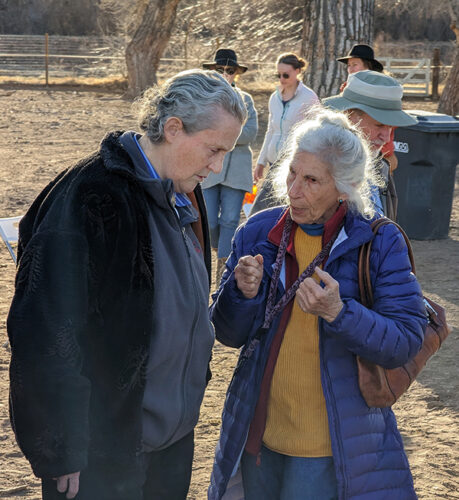
After her presentation to an audience of more than 100 people at the Wilderwood Equine Therapy center in Peralta Saturday afternoon, Dr. Temple Grandin, left, speaks with Valencia County resident Dr. Gail Goodman, right.
Grandin sees a problem in schools with the lack of hands-on classes, saying we are “paying the price right now …” with the importation of products like shipping containers and computer chip making machines from Holland.
“The reason for that, (in Holland) in ninth grade, you can go the university route or tech route and they don’t stick their nose up at the tech route,” she said.
Computers and learning virtually aren’t inherently bad, Grandin said, but the lack of teaching practical skills is detrimental.
“I had a girl in my class and she’d never used a tape measure in her life. I’m not kidding. Not a ruler or a tape measure,” she said. “When I get asked, ‘What would I do to fix the schools?’ I’d put all the hands-on classes back in — art, music, theater, woodworking, auto shop, welding. Not take the computers away. I’m going to put these classes back in.
“And the reason why you need these classes is that they expose students to career options. You have to get exposed first. And then mentoring has to happen. I had a lot of good mentors in the construction industry.”
There are many job opportunities that rely on mechanical skills and knowledge, Grandin said, which can be ideal for visual thinkers like herself and other people with autism.
“Computers aren’t going to fix elevators. Computers run them, but until we get anti-gravity devices, they still run on hydraulics and cable and they’re not changing any time soon.”
Dr. Rebecca Evanko, the executive director at Wilderwood Equine Therapy, said the event went very smoothly, with about 100 people attending the free, morning event to meet Grandin and get a signed copy of her book, and another 150 purchasing tickets to the afternoon talk.
“We were worried because it was a big event, certainly much larger than we’ve ever hosted. I think the biggest key to the success was the training of our volunteers and their dedication,” Evanko said. “We’ve been overwhelmed by the number of positive comments.
“Many people are appreciative that someone with Temple Grandin’s standing could be here in our local community. This was not a Santa Fe event. This was not a New York event. This was a Peralta, New Mexico, event. It just shows if you keep pursing something, you can make things happen.”
Julia M. Dendinger began working at the VCNB in 2006. She covers Valencia County government, Belen Consolidated Schools and the village of Bosque Farms. She is a member of the Society of Professional Journalists Rio Grande chapter’s board of directors.

